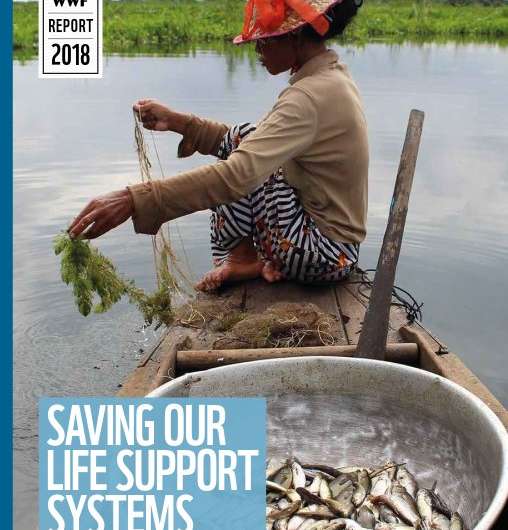Wetlands, our life support systems, need more than drip-by-drip assistance, warns new report

With wetlands continuing to disappear at an alarming rate, a new WWF report calls for countries to urgently expand efforts to protect and restore one of the world's most valuable ecosystems, which underpin a sustainable future for people and nature.
Launched today at the 13th Conference of the Parties to the Ramsar Convention on Wetlands, Saving our Life Support Systems highlights the importance of healthy wetlands in tackling many of humanity's most pressing challenges: from mitigating climate change to feeding the world's growing population and from halting the loss of biodiversity to supplying water to rapidly expanding cities.
The report points to some significant successes. Over the past twenty years, WWF has supported the designation of 377 Ramsar sites in 52 countries from Argentina to Zimbabwe amounting to almost 110 million hectares of internationally protected wetlands – an area roughly twice the size of Spain. Ramsar now boasts the world's largest network of protected areas, almost half of which were designated by countries with support from WWF. For example, Doñana National Park was created in 1969, including two pieces of land acquired by WWF, and was the first protected wetland in Spain at a time.
"Swamps, bogs, marshes and mangroves may not be as famous or photo-friendly as rainforests and coral reefs, but we can't survive without them," said Stuart Orr, WWF Freshwater Practice Lead. "The world needs to value wetlands and drastically ramp up efforts to protect them. As climate change becomes an inescapable reality, healthy wetlands provide the best natural defence against devastating floods and storm surges as well as the daily supply of water and food."
The report shows that wetlands sustain life. They provide a home to 40 per cent of the world's species, while supplying people with water and food. More than 1 billion people, including indigenous people across the globe, depend on them for their livelihoods. They are critical to global efforts to mitigate and adapt to climate change, with peatlands in particular storing vast amounts of carbon, while healthy floodplains and mangroves help protect cities from extreme floods and storm surges.
But the world has lost 35 per cent of its remaining wetlands in the past 45 years – and the rate of loss has only increased since 2000. In the case of Europe, two-thirds of wetlands were lost by the mid-1980s and, today, water ecosystems (including wetlands, rivers and lakes) are in a dire state, experiencing the most significant deterioration and biodiversity decline. A pitiful 40% of them are currently healthy (EEA, 2018) and meet the 'good status' objective outlined in the EU water law – the Water Framework Directive. This is largely due to dam development, climate change, pollution, and soaring demand for water to irrigate farms and fuel hydropower plants.
To reverse this trend, it is essential that Member States ensure that EU legislation for the protection of wetlands (the EU Water Framework Directive and the EU Birds and Habitats Directive) work not just on paper, but in practice. Through the Water Framework Directive (WFD), EU Member States agreed to put a stop to the destruction of our wetlands and other freshwater ecosystems, and to restore them by 2027 at the very latest. It has so far been poorly implemented by Member States, and is now undergoing its standard 'fitness check'. Many Member States will be using this process to try to attempt to weaken the law. A weak WFD would also threaten the objectives of the Ramsar Convention in Europe, which implementation of the WFD supports.
"Full, effective implementation of the Water Framework Directive is a non-negotiable in the fight to save Europe's wetlands and biodiversity", said Martina Mlinaric, Senior Water Policy Officer at WWF's European Policy Office. "Member States have been shirking their commitments for far too long and, now, they are trying to use the European Commission's fitness check process to destroy this visionary law. It's time they heard it loud and clear from citizens themselves: Don't water down the law!"
To combat this push from Member States to weaken the WFD, WWF, together with 100 other NGOs, launched the #ProtectWater campaign on 9 October. The campaign calls on the European Commission to defend the WFD, providing an easy tool for citizens to express their support through the European Commission's public consultation on the WFD, which will run until 4 March 2019.
Whilst today's report focusses on WWF's support for the creation of new protected wetland areas, WWF also works with communities, partners and governments to protect and manage wetlands, and raise awareness about the urgent need to halt the destruction of what remains of these critical ecosystems.
More information: The full report is available online: d2ouvy59p0dg6k.cloudfront.net/ … upport_systems_1.pdf
Provided by WWF



















